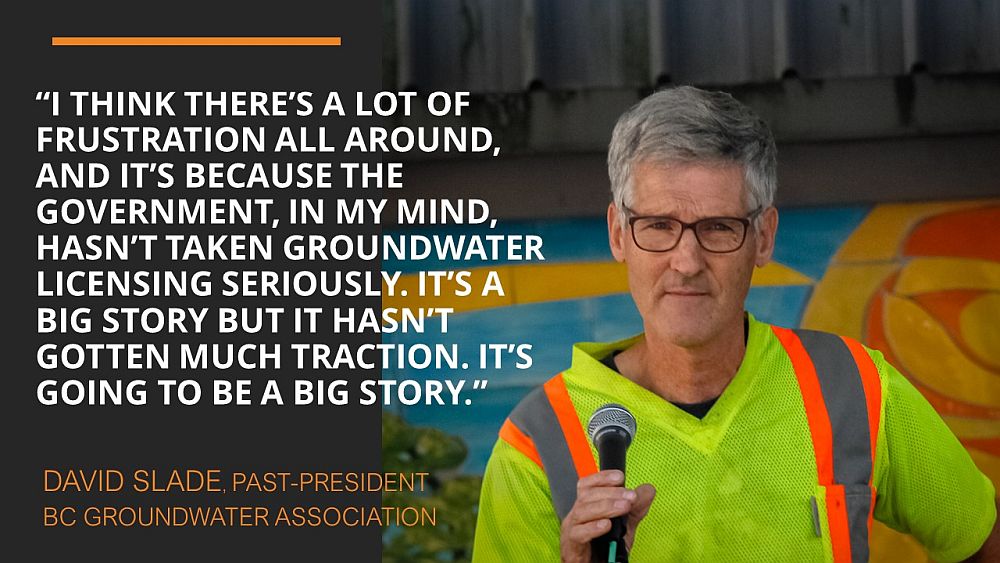GROUNDWATER LICENSING IN BRITISH COLUMBIA IS A CRISIS IN THE MAKING: “I think there’s a lot of frustration all around, and it’s because the government, in my mind, hasn’t taken this file seriously. It’s a big story but it hasn’t gotten much traction. It’s going to be a big story,” stated David Slade, a Past-President of the BC Groundwater Association (August 2021)
Note to Reader:
In 2016, water management in BC entered a new era with passage of the Water Sustainability Act. The WSA made it a legal requirement that all non-domestic groundwater users in BC be licensed or otherwise authorized. At the time, there were an estimated 20,000 non-domestic groundwater users in BC. With only months remaining until the March 1, 2022 deadline to apply for a licence, a mere 1 in 5 groundwater users have applied.

British Columbia’s Faltering Effort to Manage Water Use Brings a Looming Crisis
Andrew MacLeod of The Tyee online magazine is the latest journalist to add his voice to the call for action by the government of British Columbia to do more, and quickly, to encourage historical groundwater users to apply for a water licence before March 1, 2022. He joins Ben Parfitt and David Zirnhelt, among others, to quote Mike Wei and Donna Forsyth in their articles.
Mike Wei and Donna Forsyth, formerly with the Ministry of Environment are retired civil servants who were part of the team to develop BC’s transformational Water Sustainability Act and groundwater legislation.
Groundwater licensing is the biggest endeavour the Province of BC has taken on in its water management history. There are an estimated 20,000 historical groundwater wells supplying farms, businesses, industries, utilities, and institutions across the province. Yet, after 5-plus years, a mere 1 in 5 have applied for a water licence. March 1, 2022 is the looming deadline to apply. Now it is a crisis in the making. What will it take to motivate the other 4 in 5 to apply in their own self-interest?

Farms across BC rely on well water for irrigation. If they don’t register by March 1, the supply could be cut off. Photo by Brad Smith, Creative Commons license CC BY-NC 2.0.
Critics Blame Government Inaction
“The way it looks to David Slade, a water-well driller with 50 years of experience, some 15,000 British Columbia groundwater users are going to become criminals overnight next March,” wrote Andrew MacLeod in his opening sentence.
“That certainly seems to be the trajectory we’re on now,” said Slade, who is based on Vancouver Island and is a past president of the B.C. Groundwater Association. “I don’t know if it’s willful ignorance, or just people are ignoring it in hopes it will go away.”
 According to Mike Wei, wrote Andrew MacLeod, “the goal was to allow the government to allocate water use so that streams and aquifers can be managed to keep them sustainable. It’s the little day-to-day things that we do or don’t do that will determine the sustainability of the water resource. It’s the small businesses that I’m really worried about. They don’t know what the consequences are.”
According to Mike Wei, wrote Andrew MacLeod, “the goal was to allow the government to allocate water use so that streams and aquifers can be managed to keep them sustainable. It’s the little day-to-day things that we do or don’t do that will determine the sustainability of the water resource. It’s the small businesses that I’m really worried about. They don’t know what the consequences are.”
 MacLeod then quoted Donna Forsyth as follows: “We’ve got this huge potential for a serious gap in our food production, and the urgency of the situation is not being communicated. We also have potentially thousands of non-food related businesses that will be impacted in the same way, and the combination will seriously impact the success of the B.C. recovery plan. The government needs to stop pretending that everything is going to go smoothly.”
MacLeod then quoted Donna Forsyth as follows: “We’ve got this huge potential for a serious gap in our food production, and the urgency of the situation is not being communicated. We also have potentially thousands of non-food related businesses that will be impacted in the same way, and the combination will seriously impact the success of the B.C. recovery plan. The government needs to stop pretending that everything is going to go smoothly.”
To Learn More:
To read the complete article by Andrew MacLeod, download a copy of BC’s Faltering Effort to Manage Water Use Brings a Looming Crisis
After that, download a copy of Living Water Smart in British Columbia: Groundwater Users Put on Notice, a Primer released by the Partnership for Water Sustainability in July 2021. This document builds on an earlier Primer released by the Partnership in April 2021 to draw attention to the serious nature of the groundwater licensing issue. Mike Wei and Donna Forsyth are primary contributors to both Primers.
The second Primer is not a technical report. It is a compendium of very persuasive and informed opinions from people who have expert knowledge and really understand the issue. The Primer provides context and perspective on the value of a water right and why it is worth the time and effort by farmers and small businesses to APPLY RIGHT NOW for a water licence.


